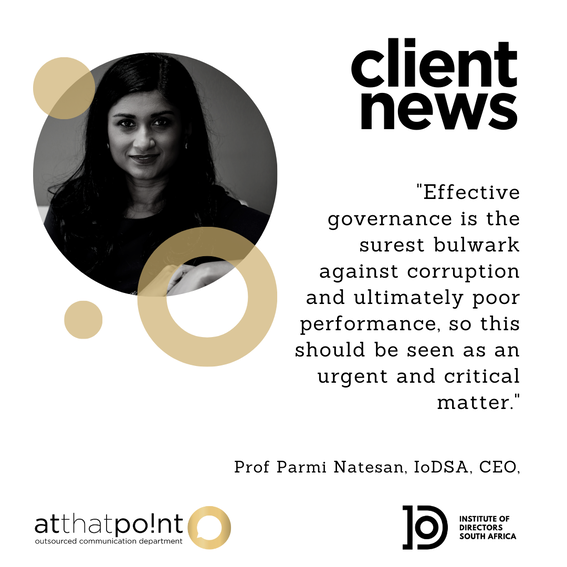|
According to a recent news report, the Minister of Higher Education, Blade Nzimande, is considering a legal review of the governance frameworks at South Africa’s universities in order to stem the rising tide of corruption and mismanagement at these institutions. Professor Parmi Natesan, CEO of the Institute of Directors in South Africa (IoDSA) says that the Department can rely on King IV to help him put the necessary governance reforms in place.
“King IV was drafted to be applicable to all types of organisations. Because it is outcomes-based, King IV is flexible—it’s not about following a rigid template but rather taking appropriate actions that will lead to the desired end results,” she says. “While it’s a voluntary code, it is considered governance best practice and it would thus make sense for the Minister to rely on it to guide his actions in reforming governance in the university space. The Department’s own ‘Guidelines for Good Governance Practice’ is also an excellent resource.” The Minister is reported as being particularly concerned about several issues that have repeatedly cropped up in university assessors’ reports. Professor Natesan makes the following comments on these specific areas of concern: Lack of skills and experience of members of university councils. Lack of skill and experience, especially as regards governance best practice and serving as a director, is one that affects many organisations, especially in the public sector. The IoDSA has long since identified the need to build up a talent pool of professional directors who combine their existing sector knowledge and experience with a comprehensive set of directorial competencies. The Institute developed a Director Competency Framework to help the public understand what is needed to serve as a director, and to help prospective directors acquire and maintain these skills via its training programmes. It has also created two SAQA-recognised professional designations for directors. Individuals guilty of transgressions at one university find employment at others. As the ultimate governance custodian, the university council has to ensure that succession planning for senior roles is in place, and that a transparent nominations and thorough due-diligence process is developed and mandated. This due diligence should delve into candidate’s prior track record and reputation prior to appointment. Entrenchment of corruption. Principle 1 of King IV (“The governing body should lead ethically and effectively“) makes it clear that the university council should take collective responsibility for the university’s overall performance and must be held accountable for the execution of its responsibilities. As regards corruption, particularly in the university’s supply chain, it is clearly the council’s responsibility to ensure that effective checks and balances are in place, and are constantly monitored. The council should clearly set the tone of the organisation, which should include zero tolerance for unethical behaviour. “Effective governance is the surest bulwark against corruption and ultimately poor performance, so this should be seen as an urgent and critical matter,” she says. “As the owner of the King Reports and advocate for governance, the IoDSA stands ready to assist the Department with recommendations if needed.” ENDS MEDIA CONTACT: Stephné du Toit, [email protected], 084 587 9933, www.atthatpoint.co.za For more information on the IoDSA please visit: Website: www.iodsa.co.za Twitter: @The_IoDSA LinkedIn: Institute of Directors South Africa Company Page Facebook: Institute of Directors South Africa
0 Comments
Leave a Reply. |
Archives
July 2024
Categories
All
|


 RSS Feed
RSS Feed